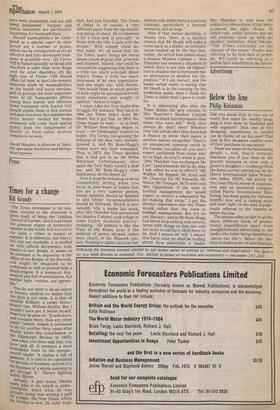Press
Times for a change
Bill Grundy
'The Times newspaper is, we suppose, entitled to the character it gives itself, of being the 'Leading Journal of Europe', and it is perhaps the greatest engine of temporary Opinion in the world. Still it is not to our taste — either in matter or manner. It is elaborate, but heavy; full, but not readable; it is stuffed aP with official documents, with matter-of-fact details. It seems to be intended to be deposited in the Office of the Keeper of the Records, and might be imagined to be composed as well as printed with a steam-engine. It is pompous, dogmatical and full of pretensions, but neither light, various, nor agreeable."
You do not need to be an expert at literary analysis to realise that the style is not mine. It is that of another William: a rather betterknown one, William Hazlitt. But I couldn't have put it better myself. Hear how he goes on: "It sells more, and contains more, than any other Paper" (which, indeed, it continued to do for another forty years after Hazlitt wrote this contribution to the Edinburgh Review in 1823); and when you have said that, you have said all. It presents a most formidable front to the inexperienced reader. It makes a toil of Pleasure. It is said to be calculated for persons in business, and yet it is the business of a whole morning to get through it." Them's fighting words, Mister.
Actually, really it gets worse. Hazlitt
stan Piles it on which is understandable, since what he was
actually doing was writing a puff
().r a Paper, the New Times, which Ins brother-in-law, Dr John Stod dart, had just founded. The Times of today is, of course, a very different paper from the one Hazlitt was going on about. He condemned it for a total lack of principle: "It floats with the tide: it sails with the stream." Well, nobody could say that today. We all know that, for the Times, many things are moral issues, issues of great pith, principle and moment. Indeed, one could be excused for suggesting that there is a trifle too much principle about today's Times, a trifle too much awareness of its own importance. And one might say, with Hazlitt, "One would think so much gravity of style might be accompanied with more steadiness and weight of opinion." And so it might.
I mean, take the Tory leadership struggle, for instance. Way back in 1964 the Times didn't want Mr Heath, but it got him. In 1974, the Times began to want — or at least Mr William Rees-Mogg began to want — Sir Christopher Soames as leader. The Tories, recognising the daftness of the idea, very sensibly ignored it, and Mr Rees-Mogg's wishes were not their command. Then in 1975, the Times decided that it had got to be Mr Willie Whitelavv. Unfortunately, once again the Tory Party turned a deaf ear, and Mr Rees-Mogg's cries faded away on the desert air.
Now it must be irritating to be so consistently wrong when you know in your heart of hearts that you are a very superior person, whose opinions should be listened to and whose recommendations should be followed. Which is presumably why a leader last week, after Mrs Thatcher had announced her Shadow Cabinet, took refuge in some highly doubtful historychopping: "All politics is like the Wars of the Roses, even if the skeleton of power showed rather more clearly in the fifteenth century. No king or queen can ever feel entirely safe while there is a serious claimant, particularly a deposed monarch, still at large."
Now if that means anything, it means that there is a distinct chance that Mr Heath will make a come-back as a leader, an interpretation backed up by the fact that, earlier, the article had talked about a shadow Shadow Cabinet — -Mrs Thatcher has created a situation in which there is not only an Opposition to shadow the Government but an alternative to shadow the Opposition." If I am correct, and the leader writer really is saying that Mr Heath is in the running for the leadership again, then I think the Times is sillier than I gave it credit for.
It is interesting also that the Times thinks the new recruits to Mrs Thatcher's Shadow Cabinet "seem so much less impressive than those who have left." Well, they always do, don't they? Whether they will still do after they have had a chance to show their paces is another matter altogether. There's an unexpected common touch in the Leader, too (after all, you don't expect earthiness from those who sit on high, do you?), when it says: -Mrs Thatcher has exchanged Mr Carr" (and whatever did he do, may I ask, when he was in office?) "Mr Walker, Mr Rippon, Mr Scott and Mr Channon for Mr Edwards, Mr Neave, Mr Younger, Mr Fowler and Mrs Oppenheim. If she were in football management she would expect to receive a substantial fee for making that swop." I get the distinct impression that the Times would rather that she were in football management. But it's no use. She isn't, and so Mr Rees-Mogg had better stop sulking and come to terms with things as they are, and not as he would have liked them to be. And I expect he will. I expect that fairly soon we shall be reading about how admirable a leader Mrs Thatcher is, and how the instinctive shrewdness of the party produced the right choice. In which case, unfair persons like me will probably come up with yet another quotation from Hazlitt: The Times conforms to the changes of the times." Hazlitt was referring to its then lack of principle. We could be referring to a similar lack sometime in the future.

































 Previous page
Previous page